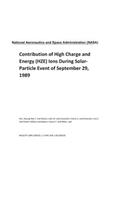
Contribution of High Charge and Energy (Hze) Ions During Solar-Particle Event of September 29, 1989
Series:
The solar-particle event (SPE) of September 29, 1989, produced an iron-rich spectrum with energies approaching 1 A GeV with an approximate spectral slope parameter of 2.5. These high charge and energy (HZE) ions challenge conventional methods of shield design and assessment of astronaut risks. In the past, shield design and risk assessment have relied on proton shielding codes and biological respo
1989
VOLUME
English
Paperback

The solar-particle event (SPE) of September 29, 1989, produced an iron-rich spectrum with energies approaching 1 A GeV with an approximate spectral slope parameter of 2.5. These high charge and energy (HZE) ions challenge conventional methods of shield design and assessment of astronaut risks. In the past, shield design and risk assessment have relied on proton shielding codes and biological response models derived from X-ray and neutron exposure data. Because the HZE spectra decline rapidly with energy and HZE attenuation in materials is limited by their penetration power, details of the mass distributions about the sensitive tissues (shielding materials and the astronaut's body) are important determining factors of the exposure levels and distributions of linear energy transfer. Local tissue environments during the SPE of September 29, 1989, with its f= components are examined to analyze the importance of these ions to human SPE exposure. Typical space suit and lightly shielded structures leave significant contributions from HZE components to certain critical body tissues and have important implications on the models for risk assessment. A heavily shielded equipment room of a space vehicle or habitat requires knowledge of the breakup of these ions into lighter components, including neutrons, for shield design specifications. Kim, Myung-Hee Y. and Wilson, John W. and Cucinotta, Francis A. and Simonsen, Lisa C. and Atwell, William and Badavi, Francis F. and Miller, Jack Johnson Space Center; Langley Research Center NASA/TP-1999-209320, L-17744, NAS 1.60:209320
Price Comparison [India]
In This Series
Bestseller Manga
Trending NEWS




















